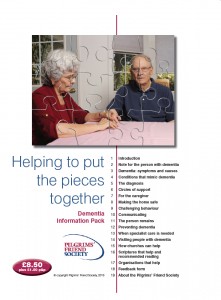 If you’re a volunteer on a Christian telephone help line what do you say to someone who rings in and says, ‘Help! I think I might be developing dementia!’ Or, ‘I think my mother is developing dementia but she won’t see the doctor?’
If you’re a volunteer on a Christian telephone help line what do you say to someone who rings in and says, ‘Help! I think I might be developing dementia!’ Or, ‘I think my mother is developing dementia but she won’t see the doctor?’
Phone line volunteers, counsellors and pastoral workers came to an Association of Christian Helplines (ACH) conference in Coventry recently. They heard from Bob & Joy Jones (Care for the Family), Debra Chand (Torch Trust), and me.
My talk described what dementia is, and what it isn’t and explained how it is unique to each sufferer, being a mixture of the pathology and the individual’s personality. Not having a ‘template’ makes it hard for even medical professionals to explain what’s happening at times precisely.
Also, it’s far from simple to diagnose. GPs check first for physical causes, and then run other tests, including the Mental Mini State Examination – which is known to be ineffective for some, especially those with high levels of education and those with low. Consultant neurologist Professor Markus Reuber and his team at the Hallam Memory Centre in Sheffield are using a new, Conversation Analysis technique, which they hope will help GPs assess more accurately.
But the encouraging thing is that half the people sent to Memory Centres in England by their doctors don’t have dementia. And people who are concerned that they might be (the worried well) are usually not. So what to do if you think a family member might be heading for dementia yet won’t see the doctor? First, check if they are eating properly, because many older people reach a state where they can’t be bothered, and they can become anaemic. It’s important, because elderly bodies don’t absorb nutrients as efficiently as younger. Also check if the person is stressed or depressed.
You could suggest a visit to the doctor for physical checks, and telephone your concerns in advance. Or, do as a colleague did – visit the doctor yourself. He or she can decide whether or not to call your relative in for a general check-up.
Most of all, people phoning helplines or going for counselling with dementia worries need empathy, and to be listened to very carefully. Caregivers need to know that when they are doing their best, God knows and doesn’t ask for more! The participants at the ACH day were brilliant! Completely engaged and wanting to know everything.
Our dementia information pack, ‘Helping to Put the Pieces Together’ is helping hundreds and hundreds of people. It has separate pull out leaflets on different topics, including ways of communicating and understanding challenging behaviour, as well as basic information on dementia itself.
The National Christian Helpline number is 0300 111 0101. It’s a standard charge rate, and is open from 9.00 am to midnight every day.















